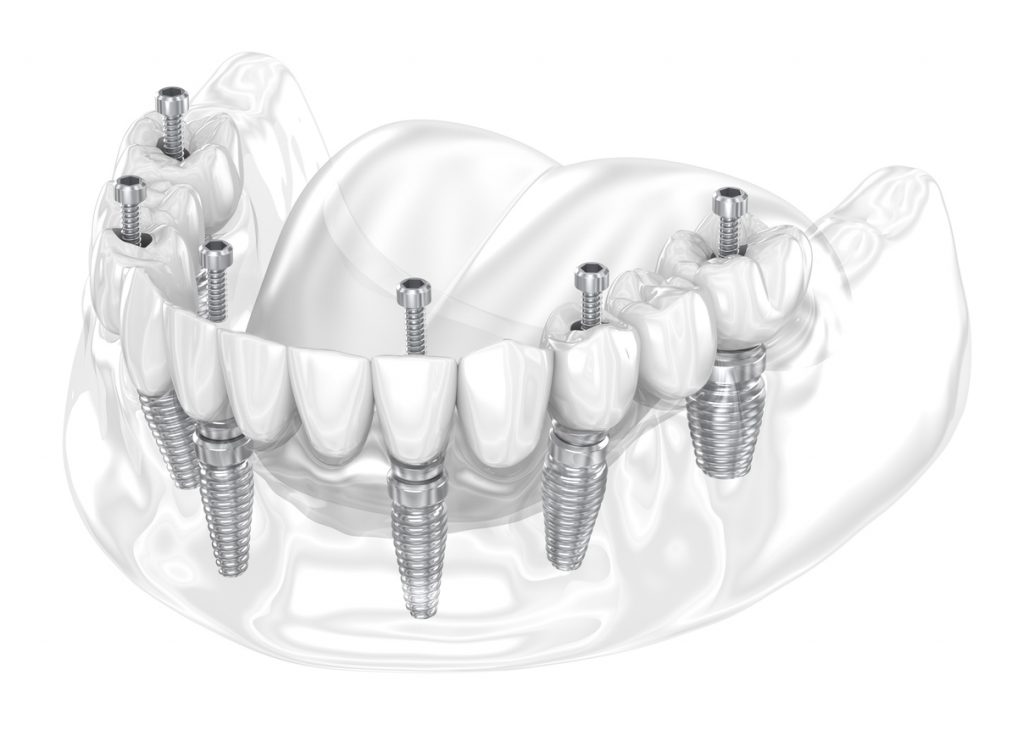Losing teeth is more than a cosmetic issue—it can seriously affect the health of your jawbone. The Teeth-in-a-Day procedure offers a solution that not only restores your smile but also helps preserve your jawbone, preventing further deterioration. Let’s explore why missing teeth lead to jawbone atrophy and how dental implants can stop or even reverse the damage.
What Happens to Your Jawbone When Teeth Are Missing?
When you lose a tooth, the jawbone beneath it begins to deteriorate through a process called bone resorption. Your jawbone stays strong and healthy when stimulated by the pressure of chewing, which travels through the roots of your teeth. When a tooth is lost, that stimulation disappears, signaling to your body that the bone in that area is no longer needed.
Without stimulation, the bone starts to shrink and weaken. This can happen surprisingly fast. Studies show that 25% of bone mass can be lost within the first year of losing a tooth. Over the next few years, the bone loss continues, and its effects become more pronounced—not just in your mouth but across your entire facial structure.
The process of bone resorption doesn’t stop at the site of the missing tooth. Over time, it can spread to neighboring areas, leading to additional bone loss, misalignment of remaining teeth, and significant changes to your facial appearance.
How Does Missing One Tooth Differ from Multiple Missing Teeth?
If you are missing just one or two teeth, the effects of bone resorption are localized. The surrounding teeth may shift slightly over time, and the jawbone loss is often limited to the area where the tooth root is missing. However, this localized bone loss can still compromise the alignment of your bite and cause nearby teeth to loosen.
When you are missing multiple teeth—or worse, an entire arch—the bone loss becomes far more significant. Without the stimulation from any tooth roots, large sections of the jawbone lose their density. This can lead to:
- A sunken, aged appearance in the lower face (often referred to as facial collapse).
- Difficulty eating and speaking properly.
- Weakening of the jawbone, which makes it harder to place dental implants in the future.
The more teeth you lose, the more pronounced these issues become. This is why replacing missing teeth as soon as possible is so important for preserving both oral function and bone health.
How Do Dental Implants Prevent Bone Loss?
Dental implants are unique because they replace not just the visible part of the tooth (the crown) but also the root. The implant post, typically made of titanium or zirconia, is surgically placed in the jawbone, where it fuses with the bone through a process called osseointegration.
This fusion mimics the natural stimulation provided by tooth roots. When you chew, the implant transfers pressure into the jawbone, keeping it active and preventing resorption. In fact, dental implants are the only tooth replacement option that preserves and even stimulates bone growth.
The Teeth-in-a-Day procedure takes this benefit a step further. Instead of waiting months for implants to heal, Teeth-in-a-Day allows you to receive a full set of replacement teeth immediately after implant placement. This not only restores your smile and function quickly but also starts stimulating the jawbone right away, reducing the risk of bone atrophy.
How Fast Does Bone Resorption Occur Without Teeth?
Bone resorption begins almost immediately after a tooth is lost. During the first three months, bone loss occurs rapidly, particularly in the width of the jawbone. Within the first year, the jawbone can lose up to 25% of its volume in the affected area.
The rate of bone loss slows down after the first year but continues over time. If left untreated, severe bone loss can occur over five to ten years, leading to:
- A receding gum line.
- Reduced jawbone height and width.
- A more fragile jaw that is prone to fractures.
The longer you wait to replace missing teeth, the more difficult it becomes to restore the jawbone. Extensive bone loss may require procedures like bone grafting before implants can even be placed.
What Are the Long-Term Effects of Jawbone Loss?
The effects of jawbone loss go far beyond your mouth. While the most obvious change is the aesthetic impact, such as sunken cheeks and an aged appearance, bone loss can also lead to functional and health-related problems, including:
- Difficulty chewing and eating: Missing teeth and bone loss make it hard to chew nutritious foods like fruits, vegetables, and protein-rich meats, leading to dietary deficiencies.
- Speech issues: Bone loss and missing teeth can affect your ability to pronounce certain words clearly.
- Loss of facial support: Severe bone loss leads to a collapsed jawline, altering your facial structure and making you look older.
- Increased dental problems: Shifting teeth, gum recession, and weakened bone structure make it easier for remaining teeth to loosen or become infected.
Replacing your teeth with dental implants can stop these effects. Teeth-in-a-Day ensures you don’t have to wait to start restoring your jawbone health and overall function.
Can Teeth-in-a-Day Reverse Bone Loss?
While Teeth-in-a-Day cannot completely reverse bone loss that has already occurred, it can stop further resorption and stimulate the growth of new bone around the implants. This happens because the implants act as artificial tooth roots, signaling to your body that the jawbone in those areas is still needed.
In some cases, the bone around the implants can grow denser over time. This is why dental implants are often recommended as a long-term solution for tooth loss, even for patients with some level of existing bone atrophy.
How Do Teeth-in-a-Day Work?
Teeth-in-a-Day combines the placement of dental implants with a set of temporary, fixed teeth that are secured to the implants the same day. This approach offers several benefits:
- Immediate restoration: You leave the office with a functional, beautiful smile.
- Bone preservation: The implants begin stimulating your jawbone right away, preventing further loss.
- Shorter treatment timeline: Traditional implants require months of healing before teeth can be placed. With Teeth-in-a-Day, you get results faster.
This procedure is particularly beneficial for patients who are missing multiple teeth or are at risk for significant bone loss.

Is Teeth-in-a-Day Right for You?
If you have missing teeth, Teeth-in-a-Day may be the ideal solution to restore your smile, improve your oral function, and preserve your jawbone. By acting quickly, you can prevent the long-term consequences of bone loss and enjoy the benefits of a strong, healthy smile.
Talk to our dental team about whether Teeth-in-a-Day is right for you. We can assess your jawbone health and help you determine the best path forward for your needs. Schedule a consultation.
What It All Means
Teeth-in-a-Day isn’t just about aesthetics—it’s about saving your jawbone and overall oral health. Bone loss begins quickly after losing teeth, but dental implants provide a way to stop the damage and even stimulate new bone growth. With Teeth-in-a-Day, you can regain your smile and protect your jawbone in a single day, setting the foundation for a healthier, stronger future.





